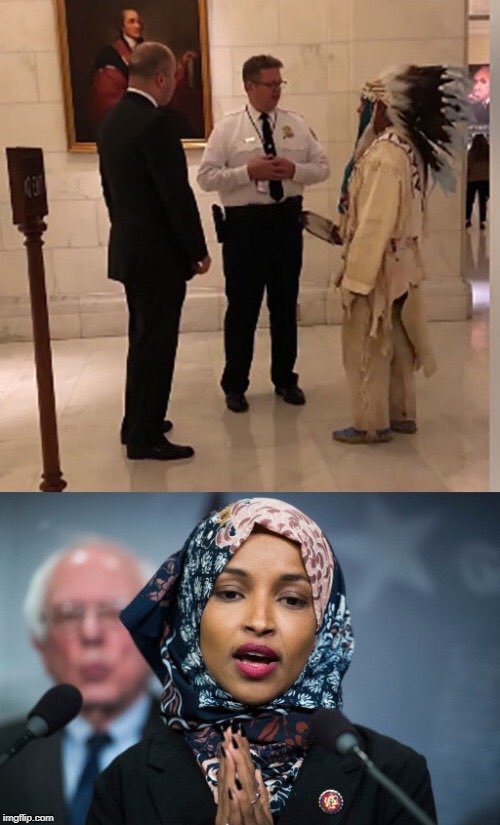
Tribal Chairman JoDe Goudy was barred for US Supreme Court because he insisted on wearing full traditional Tribal Regalia
NOW we are allowing Ilhan Omar to wear a Hajib On the House Floor

Breaking a 181 Yr old Rule! WAKE UP AMERICA Before it’s too late!
https://twitter.com/KimberlyMrsRR1/status/1086626213744074752
-----------------------------------
Tribal Leader Wearing Headdress Denied Entry to Supreme Court
Yakama Nation Tribal Council Chairman JoDe Goudy was barred from U.S. Supreme Court oral argument Oct. 30 because he insisted on wearing the full complement of his traditional tribal regalia, which he said left him feeling “very dehumanized.”
Goudy traveled from Washington State to Washington, D.C., to hear an argument involving a treaty between his tribe and the government.
Court personnel offered multiple rationales for keeping Goudy out of the argument if he wore the headdress, Goudy told Bloomberg Law the day of the argument. Their reasons included concerns that his headdress would obstruct others’ views and that his attire could sway the court’s decision in the case, he said.
“The court is not to be subject to outside influence,” a court official can be heard telling Goudy in a video he took from inside the Supreme Court building that day and posted to his Facebook page.
“The main overall thing is that we do not want to draw attention to a particular case or a particular litigant in the case, so that the court is not influenced by that,” the official said to Goudy in the video. “You can go inside the courtroom without the headdress.”
Goudy said he offered to sit in the back so as not to obstruct anyone’s view, but was still denied permission. He refused to remove the headdress, and so was not allowed in.
But according to the Supreme Court Public Information Office, Goudy had good reason to expect the rejection.
“Before Mr. Goudy came to the Court, representatives contacted the Court on behalf of Mr. Goudy and other members of the Yakama Indian Nation to inquire whether members of the tribe could wear traditional Indian clothing and headdresses in the Courtroom,” the Public Information Office told Bloomberg Law Oct. 31.
The court “informed Mr. Goudy’s representative that the Court prohibits hats and other head coverings in an effort to prevent obstructed views and for matters of Courtroom security,” the PIO said.
Hats or head coverings are permitted in the courtroom for religious or medical reasons only, the PIO said.
The court also said it was told that Goudy wears the headdress for tribal ceremonies and meetings, “but not for ordinary activities and that he would not be wearing it in the Courtroom as a matter of belief or religious requirement.”
But Goudy disputes the court’s account and, more broadly, its conception of religion.
That’s because the Yakama nation doesn’t separate church and state, Ethan Jones, their lead attorney, told Bloomberg Law. Religion is a fundamental part of every aspect of their government and Goudy’s leadership, he said.
The 1855 treaty at issue in the case was supposed to preserve a traditional way of life, Jones said. So to have the Supreme Court force Goudy to adhere to standards of westernized attire in these circumstances is offensive, he said.
At any rate, Goudy will never be able to see the argument, because the court doesn’t video-record them. He can hear it at the end of the week when the court uploads the audio to its website.
The issue before the court was whether the treaty exempts the tribe from a state fuel tax.
Goudy traveled from Washington State to Washington, D.C., to hear an argument involving a treaty between his tribe and the government.
Court personnel offered multiple rationales for keeping Goudy out of the argument if he wore the headdress, Goudy told Bloomberg Law the day of the argument. Their reasons included concerns that his headdress would obstruct others’ views and that his attire could sway the court’s decision in the case, he said.
“The court is not to be subject to outside influence,” a court official can be heard telling Goudy in a video he took from inside the Supreme Court building that day and posted to his Facebook page.
Goudy said he offered to sit in the back so as not to obstruct anyone’s view, but was still denied permission. He refused to remove the headdress, and so was not allowed in.
But according to the Supreme Court Public Information Office, Goudy had good reason to expect the rejection.
“Before Mr. Goudy came to the Court, representatives contacted the Court on behalf of Mr. Goudy and other members of the Yakama Indian Nation to inquire whether members of the tribe could wear traditional Indian clothing and headdresses in the Courtroom,” the Public Information Office told Bloomberg Law Oct. 31.
The court “informed Mr. Goudy’s representative that the Court prohibits hats and other head coverings in an effort to prevent obstructed views and for matters of Courtroom security,” the PIO said.
Hats or head coverings are permitted in the courtroom for religious or medical reasons only, the PIO said.
The court also said it was told that Goudy wears the headdress for tribal ceremonies and meetings, “but not for ordinary activities and that he would not be wearing it in the Courtroom as a matter of belief or religious requirement.”
But Goudy disputes the court’s account and, more broadly, its conception of religion.
That’s because the Yakama nation doesn’t separate church and state, Ethan Jones, their lead attorney, told Bloomberg Law. Religion is a fundamental part of every aspect of their government and Goudy’s leadership, he said.
The 1855 treaty at issue in the case was supposed to preserve a traditional way of life, Jones said. So to have the Supreme Court force Goudy to adhere to standards of westernized attire in these circumstances is offensive, he said.
At any rate, Goudy will never be able to see the argument, because the court doesn’t video-record them. He can hear it at the end of the week when the court uploads the audio to its website.
The issue before the court was whether the treaty exempts the tribe from a state fuel tax.
SOURCE
https://news.bloomberglaw.com/us-law-week/tribal-leader-wearing-headdress-denied-entry-to-supreme-court-1-1























No comments:
Post a Comment